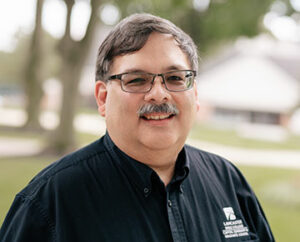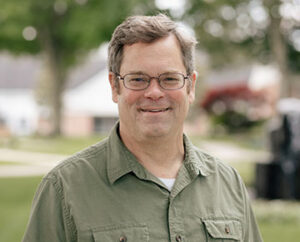LBC | Capital students within the Bible & Theology and Church & Ministry Leadership Departments at the Seminary & Graduate School level now have the option to add a concentration in theology.
The theology concentration will be available at LBC | Capital’s Lancaster campus in fall 2021 and is pending at the Washington, D.C., site, although theology courses are available and open to seminary students at the Greenbelt, Maryland location as electives for their program.
LBC | Capital’s theology concentration will also provide even more combinations of study for those working toward a bachelor’s degree and master’s degree in five years total as part of the college’s unique 4+1 program.
Two Professors of Bible & Theology who were instrumental in the formation of the theology concentration weighed in on the design of the courses and how theology benefits critical thinkers and those with ministry aspirations.
LBC | CAPITAL: Can you please share the process of designing the theology concentration?
 DR. JOE KIM: There were a couple of factors driving our decision to develop the theology concentration. One is simply the truth that ministry in any field requires a sound grasp of the truths of the Christian faith. People today are coming to realize that the Church in America has been “coasting” on the fact that Christianity has had wide influence in American culture through much of our history. Many churches simply assumed that much of the broader culture more or less aligned with the idea that there is a God, that morality has a transcendent basis, that humans need a divine Savior and things like that.
DR. JOE KIM: There were a couple of factors driving our decision to develop the theology concentration. One is simply the truth that ministry in any field requires a sound grasp of the truths of the Christian faith. People today are coming to realize that the Church in America has been “coasting” on the fact that Christianity has had wide influence in American culture through much of our history. Many churches simply assumed that much of the broader culture more or less aligned with the idea that there is a God, that morality has a transcendent basis, that humans need a divine Savior and things like that.
The idea that disciples need to have a strong understanding of what the Bible teaches about God and his purposes for the world and for humanity (in other words, theology) fell out of favor in American Christianity, and churches have often neglected the kind of theological training that Paul speaks of in places like Titus 2:1, “But as for you, teach what accords with sound doctrine.” But while the Church was preoccupied with other things, the culture changed significantly, and many dominant ideas in our society now are at odds with the Christian faith.
We wanted to address that in our Master of Biblical Studies (MABS) program, and so we developed the theology concentration to give students the opportunity to develop a stronger theological base for their ministry. This is something our students felt as well. A number of students in the MABS program have asked if they could have the opportunity to take more theology classes and dig deeper into theological studies.
We thought the time was right to address these needs, and so Dr. Gordon Gregory and I, in consultation with Dr. Finkbeiner and others of our colleagues, set out to craft a concentration that would provide students with the ability to gain a solid theological foundation for ministry and for further studies. We wanted the program to give students training in theological method (i.e., how to “do” theology), a sense of the great tradition of theological thought extending back through the history of the Church, and then opportunities to bring method and history together as they practice bringing theological truth to bear on the issues that challenge Christians and the Church in the present day.
LBC: What are some of the courses students can expect to take?
JK: The concentration consists of four theology courses—two of which are required of all students in the concentration and the other two of which are electives. The two required courses are new ones we are developing specifically for this concentration.
The first is THE 517 Theological Method. This course is the foundation for the concentration, in which students will consider the nature of theology, the relationship between biblical studies and theological studies, and how to serve the Church by doing theology in the context of contemporary evangelicalism.
The second required course is THE 518 History of Doctrine. This course is designed to give students an awareness of the development of Christian doctrine through church history and acquaint them directly with the important theological issues and great thinkers of the Church from its early days until now. Our hope is that our students will gain a deep appreciation for the work of God in leading the Church through various challenges in the past and that they will gain wisdom that will serve them as they face challenges in our own day.
Students will then have the opportunity to choose from various theological electives to round out their concentration in view of their particular interests. Some of the courses we will offer in the near future include:
- THE 519 Selected Topics in Biblical Theology: Paul
- THE 520 Selected Topics in Systematic Theology: Trinity
- THE 531 Theological Classics
- THE 510 Old Testament Theology
- THE 511 New Testament Theology
We also are considering developing some additional new offerings, including a course on the theology of John, a theology of suffering and some offerings delving into specific issues of historical theology.
LBC: Why is theology so important to study in today’s culture?
 DR. DOUGLAS FINKBEINER: All cultures have worldviews. A worldview frames how we see the world and influences what we say and do. It is like a set of glasses through which we see God, people, institutions and practices. At LBC | Capital, we are concerned that our students see all of life through a theology grounded and shaped by the Bible. Everyone wears a set of glasses. We want to intentionally help students to wear lenses from a biblical perspective rather than from a secular perspective. As our culture drifts deeper in secularism, Christians need to think, live and speak from a clear theology grounded in God’s Word.
DR. DOUGLAS FINKBEINER: All cultures have worldviews. A worldview frames how we see the world and influences what we say and do. It is like a set of glasses through which we see God, people, institutions and practices. At LBC | Capital, we are concerned that our students see all of life through a theology grounded and shaped by the Bible. Everyone wears a set of glasses. We want to intentionally help students to wear lenses from a biblical perspective rather than from a secular perspective. As our culture drifts deeper in secularism, Christians need to think, live and speak from a clear theology grounded in God’s Word.
LBC: What makes LBC | Capital’s theology concentration stand out?
DF: Our concentration begins with two classes that ground students into how to “do” theology from a biblical perspective, and looks at how the church has “done” theology throughout the ages. This foundation will serve the students as they choose elective theological courses in the area of biblical theology, historical theology and systematic theology. So, our concentration is both grounded and allows for flexibility in elective course choices. Each class is taught by an expert in the subject matter of the course.